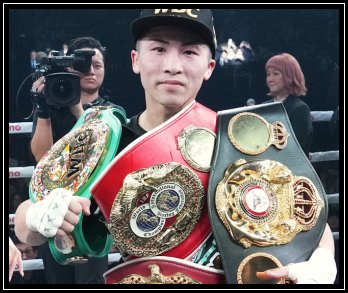
|
Philippines, 03 Mar 2026 |
Home >> News |
 |
||||
|
|
|
|
Golden Age in Japanese Boxing: How is the Bigger World to Know? By Teodoro Medina Reynoso PhilBoxing.com Tue, 23 Jul 2024  Imagine Manny Pacquiao fought only in the Philippines or Asia. Or Roberto Duran in Panama or Latin Americas. Would they have attained the success and greatness they achieved in their respective careers? Or their humungous crossover appeal to the greater boxing universe? The answer is no brainer. No way, Jose. We can make comparison with Naoya Inoue and the rest of them excellent Japanese champion fighters dominating boxing's lighter weights currently. The usual reason for keeping them at home is that paying boxing fans especially in the US do not pay much mind to little fighting men. That could be true up to the 70s though little fighting men historically had deserved place in US and Western boxing from the 1920s. Since the time of Humberto Chiquita Gonzalez, Michael Carbajal and Daniel Finito Lopez starting the 80s, appreciation for outstanding little fighting men has grown among boxing aficionados in the States especially. A boom was experienced in the lighter weights with the rise of Marco Antonio Barrera and Erik Morales which reached a series of high points with the ascendance of Manny Pacquiao and later, Nonito Donaire, Jr. This is sustained by the arrival of the likes of Roman Chocolatito Gonzalez and Juan Francisco Estrada. Now the current rave is Bam Rodriguez who stamped his mark at super flyweight and back down to flyweight and now back again at super flyweight. American and in general Western boxing fans want to see Inoue and Junto Nakatani and Kenshiro Teraji, among others, in action in the flesh or via local cable. The reason now being given is that they could earn as much or even more fighting in their native Japan where they are adored as compared to say fighting in the US or Europe. The general reason is as Inoue himself said on X, "Japanese boxing is on a golden era". I am tempted to say, so? These reasons are on face value, valid. But the thing is, how will the bigger boxing universe to know and acknowledge if Japan will keep these excellent fighters fighting at home and not share them with the traditional boxing mecca that is the US and UK? These fight centers have bigger boxing markets as well as reach that could potentially make them crossover stars and superstars. We acknowledge the ability of Japanese promoters to organize fights involving their fine top fighters and champions against visiting opposition or even against one another and market them to Japanese fans and to international audience thru DAZN for example. But reaching effectively to the larger international market is the function of a universally understood language which the mainly Japanese broadcast will not provide. Even as Japan is asserting itself as Asia's boxing powerhouse and center, one country, Saudi Arabia is likewise strongly projecting itself as boxing mecca essentially by organizing high profile big money fights involving imported boxing stars and superstars mainly in the higher weight classes. It was recently reported that Saudi sports czar Turki Alalshikh offered a huge amount for Inoue to fight in one of his promotions which Inoue chose to ignore. This only added credence to the brickbat that Inoue relishes his being a "resident" champion. One gauge of greatness that provides further mystery and intrigue is how will Inoue and company perform in foreign ring and under conditions different from what they have at home. How will we know? Or will we ever know? The author Teodoro Medina Reynoso is a veteran boxing radio talk show host living in the Philippines. He can be reached at teddyreynoso@yahoo.com and by phone 09215309477. Click here to view a list of other articles written by Teodoro Medina Reynoso. |
|
|
PhilBoxing.com has been created to support every aspiring Filipino boxer and the Philippine boxing scene in general. Please send comments to feedback@philboxing.com |
PRIVATE POLICY | LEGAL DISCLAIMER
developed and maintained by dong secuya © 2026 philboxing.com. |